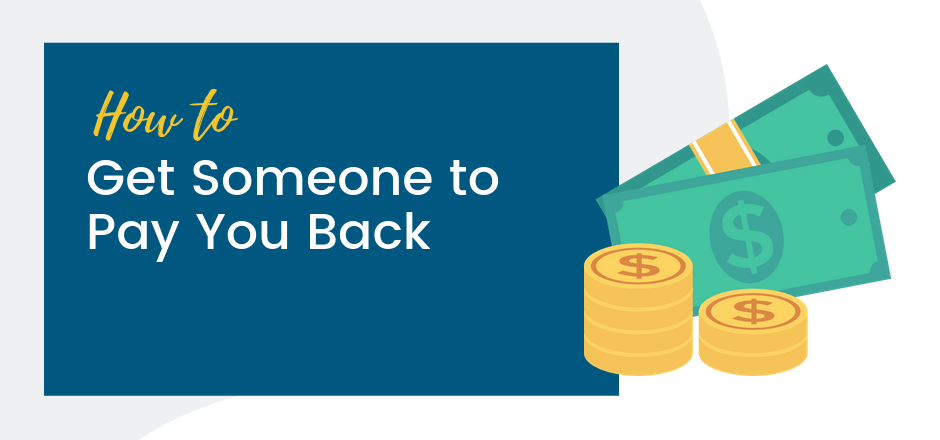How to Get Someone to Pay You Back

Does someone owe you money?
If you have ever loaned someone money, you probably know first-hand how difficult it can be to get that person to pay you back. Situations like this are unfortunate and may even tarnish or ruin a relationship.
In this article, we’re taking a closer look so you know how to get someone to pay you back.
How to Get Someone to Pay You Back
Most of us loan money to people because we understand what it’s likely to be in a position where borrowing is needed. We want to help people out, do a little good in the world, and make a friend or family member’s life a little bit easier.
There’s certainly nothing wrong with helping others out. In fact, wanting to help others is admirable. But what do you do when payday rolls around and suddenly, the person you’ve loaned money to is nowhere to be found?
The unfortunate reality is that some people always take advantage of a kind heart. But the good news is that you do have options for recouping those lost funds. From simply asking outright to taking the individual to court, this step-by-step process will help you find your way.
1. Talk to The Borrower
(This step assumes you can find the borrower. If you can’t, you can skip it altogether and head on to step three.)
If you are still in contact with the person who borrowed money from you, now is a great time to contact them and remind them of the debt. This should always be your first step unless the borrower is hiding from you. Should you be forced to sue them in court, being able to demonstrate the lengths you went to in order to get your money back will help you prove your case.
Reach out to the borrower directly, rather than via friends or family. Meet in person whenever possible; it is much harder for them to dodge or ignore you this way. If you cannot meet them in person, opt for a form of contact that leaves a paper trail: snail mail, online chat, email, or even a recorded telephone call (get permission first!).
However, you communicate with them, be sure to stick to the facts and be specific at all times. Mention your agreement, how much you loaned them, and how much they agreed to pay you back.
Try your best to avoid becoming emotional. Your goal is to make it absolutely clear what they owe when they owed it, and that they are currently late on paying you.
It’s okay to give the individual the benefit of the doubt at first. Although it almost never happens, it is possible for someone who is under a lot of stress to overlook a payment. This is especially true if the loan was small (e.g., $20 or $50).
However, you do need to make sure you don’t overextend yourself out of guilt or in an attempt to be courteous. When someone borrows money and fails to pay it back without even attempting to work something out, they have already disrespected your kindness. They put you in a difficult situation, not the other way around!
2. Try to Work It Out
Be careful with this step! You should ONLY opt for this if you feel completely confident they aren’t just trying to appease you now so they can go back to avoiding you directly afterward.
If the individual has a legitimate reason to explain why they never paid you back (e.g., they were hospitalized or lost their job), it may be in your best interest to find a compromise. Often, showing a little bit of understanding and compassion is enough to motivate them to find a resolution.
Ask the borrower when they feel they will be able to pay you back. If the timeframe is acceptable to you, get it in writing. Be sure to indicate, in writing, that they must stay in contact with you at all times, especially if they cannot meet their obligation.
If the person cannot pay you back in a lump sum, you may wish to offer them a payment plan. Sometimes, breaking a loan up into multiple payments can make it easier and more affordable for a borrower to pay money back. Just be aware that this creates multiple “risk points,” as they may stop paying at any time.
If the borrower repeatedly makes excuses, tries to claim different arrangements, or continues to avoid you, do not offer them an olive branch. At this point, they do not deserve your patience or your kindness, much less your money.
3. Demand Payment Via Certified Letter
If your borrower is avoiding you, or they flat-out refuse to make good on their loan, you’ll need to become your own personal debt collector. The best way to get started is to draft up a letter demanding payment and send it to their last known address via certified letter.
You can also have a letter delivered to their workplace if you aren’t sure of their home address. However, be aware that this is rarely accepted in good faith.
For the sake of clarity and thoroughness, any demand for payment should contain as much detail as possible:
- The date of the loan
- The loan amount
- The individual’s name
- Contact info for both of you
- The date they agreed to pay you back
- Information about what the loan was for
- Any other repayment terms the two of you agreed upon
- A copy of any promissory notes and/or other loan documents
Include a passage that clearly and directly asks them to pay you back, including details regarding the amount and preferred payment type. Demand that the debtor contacts you within a reasonable period of time (10 or 15 business days is more than sufficient).
4. Contact a Lawyer
At this point, it is usually clear that the individual does not intend to pay you, has no respect for your generosity, and probably has no intention of paying you back unless you force them to. Whether your certified letter is returned or the debtor refuses to contact you or pay you, your next best step is to find a lawyer near you.
Your first questions for any lawyer should be whether they have experience with personal debt cases and how much they charge. You’ll gain the most benefit if the lawyer’s fees are equivalent to less than 50% of the debt.
Not sure how to find a lawyer? Try a legal referral service. These organizations take basic information about your case and cross-match it to local attorneys who best match your needs.
5. Have Your Lawyer Take Action
After you officially hire an attorney, they can help get someone to pay you back in a variety of ways.
- They can help you review your case to see whether or not you might succeed. This is a must before you decide to sue for payment.
- They can help you draft and send an official legal demand for payment. This is the same as the letter you sent yourself, but legal letters are usually notarized, and thus, more “recognizable” in the civil court.
- They can help you track down the right contact information for your debtor, should they attempt to dodge you. Often, this is done by working through a background screening service or a private investigator.
Having an attorney on your side can also help you avoid inadvertent pitfalls, like a debtor accusing you of harassment or illegal debt collection methods after a particularly terse exchange. This happens more often than you might think.
If both you and your lawyer have no luck getting someone to pay you back, you may need to escalate even further by taking the debtor to court. This starts with filing a small claim in the Civil Court of California. There are fees associated with filing; however, you may be able to include these in the total.
In many cases, once the debtor sees you are willing to take them to court, they begrudgingly agree to settle their debt just to avoid it.
Conclusion
If you loaned money to someone and they refuse to repay the debt, you may feel frustrated and helpless. However, by following the steps outlined above, you will be able to effectively collect the money owed to you and settle the matter.
Start by talking with the person who owes you money and try to work out a repayment plan. In many cases, people are unable to repay the debt in one lump-sum but are able to make small payments over time. However, if the person stops returning your calls or text messages, you will need to send a certified letter in order to create a paper trail confirming the debtor has received communication demanding repayment. Doing this will help your lawyer during the next step should you need to file a claim.
Are you in search for a certified attorney to represent you?
Let us help you find one today!


